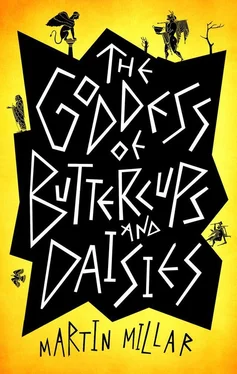‘What about Theodota?’
Aristophanes shook his head. He was starting to go grey already. ‘I can’t borrow from a hetaera. That would be the most humiliating thing imaginable.’
‘So? Take the humiliation. You want to win the play competition, don’t you?’
‘Desperately.’
‘How desperately?’
‘I’d sell my own grandmother.’
For the first time, Bremusa felt a slight stirring of sympathy for Aristophanes. She admired the will to win.
‘Then you know what you have to do.’
For a few moments they looked into each other’s eyes.
‘I’ll visit Theodota,’ he said, then turned and walked off.
Metris giggled. ‘He likes you, you know.’
‘What?’
‘He’s attracted to you.’
‘That’s the most foolish thing I’ve ever heard, even from you.’
‘I can tell,’ said Metris, blithely. ‘Because I’m a nymph. You should get together with him. Like a holiday romance.’
Bremusa scowled at her. ‘I liked it better when you were sulking.’
With the sun high overhead, Luxos marched through Athens, a determined expression on his face. Most of the playwrights rehearsed in the same area, and Luxos planned to visit them all if necessary. He strode up to a gate marked Private.
‘I’m here to see Eupolis,’ he announced to the doorman.
The guard at the entrance looked down at Luxos’s long hair and shabby tunic, and his cheap sandals, which had obviously been repaired many times.
‘Who are you?’
‘I’m Luxos the poet.’
‘Ah.’ The doorman nodded. ‘Then you can’t come in.’
‘But I want to see Eupolis.’
‘Eupolis left strict instructions that no one called Luxos was ever to be allowed into his rehearsal space.’
Luxos blinked. ‘Really?’
‘Yes.’
‘He actually named me?’
‘Yes.’
‘Oh.’ Luxos drew himself up, which made little difference as the huge doorman still towered over him. ‘Then I shall offer my services to Leucon instead. There’s a poet with some taste who will appreciate my work.’
Luxos walked off. It was odd that Eupolis had actually barred him from entering.
Someone must have been spreading stories about me, he thought . I bet it was Aristophanes.
Luxos thought some mean thoughts about Aristophanes. It occurred to him, as he walked towards Leucon’s rehearsal space, that Aristophanes’ comedies were generally funnier than Leucon’s. Luxos had laughed a lot last year at The Wasps .
But humour isn’t everything, he thought . The beauty of the poetry is important too.
It struck him immediately that Aristophanes’ poetry was better too. He used language better than Leucon.
Well I need employment somewhere, thought Luxos, carrying on. I know these poets hire helpers to tidy up their verse, even if they don’t like to admit it.
He patted the Herm statue on the corner for luck, and approached the gate at Leucon’s. There were two doormen this time, both large. As Luxos approached they became excited.
‘It’s him!’
‘Luxos is here!’
‘Eh… hello,’ said Luxos.
The doormen looked at each other.
‘Leucon warned us this day would come,’ said one to the other.
The doormen squared up to the small figure of Luxos. ‘Begone, renegade poet. The talented and erudite Leucon does not require assistance from a skinny urchin from the slums of Piraeus!’
‘But I just —’
Luxos stopped in mid-sentence, knowing it was hopeless. Apparently every established dramatic poet in Athens had been warned about him.
They all think I’m a joke .
The realisation brought with it an abrupt depression. He turned round and walked sadly away. He wished that Metris were around. He longed to see her. But apparently she was forbidden to see him now. She was off somewhere with that strange foreign woman, and wasn’t allowed to visit him.
Luxos hung his head. Is it really that stupid for a poor person in Athens to try and write poetry? Hesiod wasn’t rich. He was just a farmer. People gave him a chance. They let him enter competitions and he proved how good he was.
Head bowed, he tucked his lyre under his arm and trudged off home, depressed and close to defeat.
Perhaps I should just stop writing poetry. No one wants to listen. Maybe I’m no good at it anyway.
Close to home, he passed a group of young girls, playing on one of the many rough patches of vacant land around the docks. He paused to watch as five of the little girls sang a song while they danced around another girl, seated in the centre.
Torti-tortoise,
Sitting on the ground
Torti-tortoise,
We’re all around
Weave a web of
Milesian wool
How did your son die?
He jumped in a pool!
As the children chanted the last line, the girl in the middle leapt up, trying to catch one of the others. There was a lot of shrieking and laughter, as whoever was caught became the new tortoise in the middle. The girls, all grubby from the rough ground, were completely involved in their play and paid no attention to Luxos.
Luxos smiled at the familiar children’s game. He’d played torti-tortoise when he was an infant. He’d sung the song, too. No one knew what the words meant any more. Who had been weaving a web of Milesian wool, and whose son had jumped in a pool, was lost in history, or myth, but the rhyme could still be heard all over Athens, when children played their jumping and chasing game.
Luxos felt a little heartened. He walked home, humming ‘Torti-tortoise’.
Good poetry is inspiring and it makes people happy , he thought, remembering the children’s smiling faces . I’m not giving up. Athens needs me.
Theodota’s taste was widely admired. She was so wealthy that she could have built the largest house in Athens if she’d wanted. Rejecting such ostentation, she lived in the third largest. It was a notable dwelling. Her private courtyard contained a statue of Apollo that would not have looked out of place in one of the city’s better temples. There were frescos on the walls painted by some of Greece’s finest artists, and her collection of pottery was staggering, second only to her collection of clothes. For a twenty-four-year-old woman who was born poor, and had moved at a young age to a city that didn’t grant that many rights to women, it was all quite an achievement.
‘Theodota’s worked for her success,’ acknowledged Aristophanes, as he approached her house. ‘She’s used her beauty, discretion and intelligence to build up a client list of the wealthiest men in the city.’
Her clients weren’t just Athenians. Theodota had received visits from famous figures from other cities too. Other countries, even.
As a hetaera, Theodota would not have been welcomed in the house of any respectable Athenian. No well-born Athenian woman would even talk to her. Her profession had put her far beyond the bounds of polite society. Aristophanes wasn’t certain how she felt about that. If she took note of the poor Athenian women in the agora, working long hours for little pay, he doubted it bothered her that much.
He announced himself at the door, having sent word that he was on his way. He hoped that no one was visiting. Even when Theodota wasn’t working, she did receive many callers. A surprising collection of artists, poets, philosophers, statesmen and writers could often be found there. The servant at the door welcomed him in, not that respectfully. Theodota’s servants, having such a rich mistress, tended to be sniffy about her guests. Even her slaves were known to be arrogant.
Читать дальше












